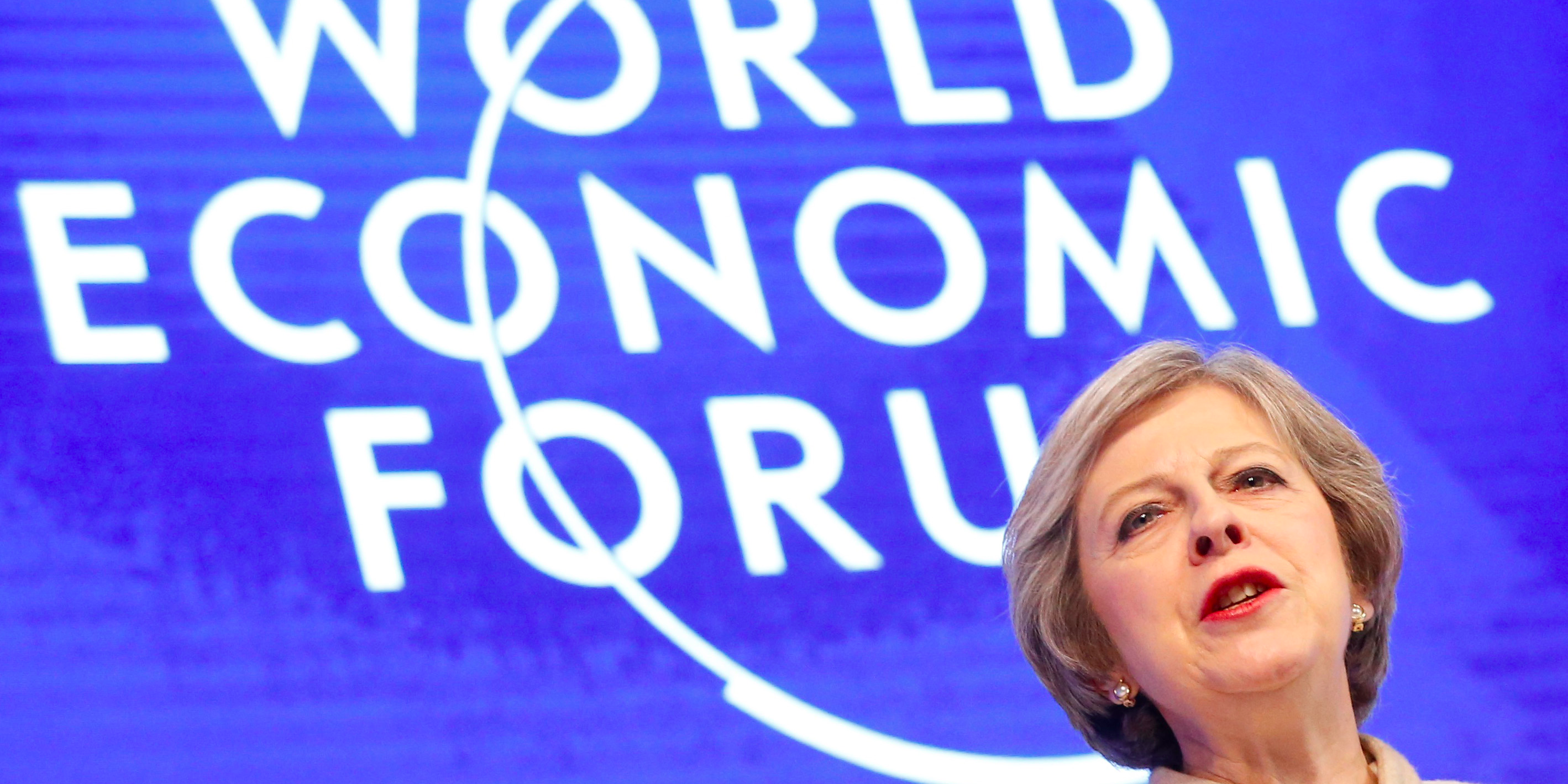- Prime Minister Theresa May addressed the World Economic Forum in Davos, Switzerland. May addressed world leaders after delivering a clearer Brexit plan on Tuesday. The speech contained her vision for a socially inclusive, global, post-Brexit Britain. “We are going to be a confident country that is in control of its destiny once again.”
DAVOS, Switzerland – Prime Minister Theresa May on Thursday told the delegates at the World Economic Forum about her vision for Britain after it leaves the European Union, as well as setting out a wider vision for political and corporate responsibility.
In a 20-minute speech delivered to a full auditorium, May pledged to create a “truly global Britain” and called for “business to show leadership” in shaping Britain post-Brexit. She called it her “manifesto for change.”
The WEF event was packed with thousands of the most powerful people in the world – from the CEOs of the largest companies to Presidents, Prime Ministers, and other political leaders from countries across the globe.
May signalled a hard stance on Brexit in her speech in London on Tuesday but she offered an olive branch to her European counterparts attending WEF on Thursday, saying: “We are all united in our belief that [the new] world is built on the foundations of free trade and globalisation.”
"[We will] forge a new place in the world. The road may be uncertain at times but those [who voted for Brexit] believe in a brighter future for Britain and [that's why] we are on a bold ambitious course. They chose a truly global Britain."
"We are going to be a confident country that is in control of its destiny once again."

Other notable lines from her speech included:
"Our decision to leave the European Union was no rejection of our friends in Europe, with whom we share common interest and values and so much else. It was not an attempt to become more distant from them."
"Nor was it an attempt to undermine the European Union itself. It remains overwhelming in Britain's national interest that the European Union as an organisation should succeed. It simply means to restore as we see it our parliamentary democracy."
"We are, by instinct, a great global trading nation. And we want to strike trade deals with old friends and new allies around the world."
"It is essential for business to show leadership - to show that in this globalised world, everyone is playing by the same rules." Businesses will also be expected to pay a "fair share" of tax.
May spoke for 20-minutes and didn't take questions from the audience at the end. That contrasts with her predecessor David Cameron, who last year took questions from the floor after addressing Davos.
May's Brexit vision
May confirmed this week that Britain plans to leave the Single Market as part of its withdrawal from the EU. She also said she would terminate Britain's membership of the free-trade area to have full control over immigration from the European Union, a "hard Brexit."
http://instagr.am/p/BPcQvJoBUnt
While some company leaders, such as the global chairman of "Big Four" consultancy firm Deloitte, believe May delivering an actual plan on Tuesday is positive, others have warned that it could severely harm the UK.
The loss of passporting rights following Brexit is one of the biggest fears in the City of London and seems almost a certainty under May's "Hard Brexit" plan.
If the passport is taken away, London could cease to be the most important financial centre in Europe, costing the UK thousands of jobs and billions in revenues. Around 5,500 firms registered in the UK rely on the European Union's passporting rights for the financial services sector, and they turn over about £9 billion in revenue.
Goldman Sachs is considering cutting its staffing numbers in London by up to 50% due to Brexit fears, according to a report on Thursday, while JP Morgan CEO Jamie Dimon said that more jobs than previously expected may have to be moved out of the UK as a result of Britain leaving the EU. HSBC CEO Stuart Gulliver has said that Brexit will push bankers making 20% of London revenue to Europe.
Earlier on Thursday, Mayor of London Sadiq Khan said a "Hard Brexit" would be terrible for the European Union as well as Britain because if businesses relocate, it will be to Asian countries or the US, not other European cities.

